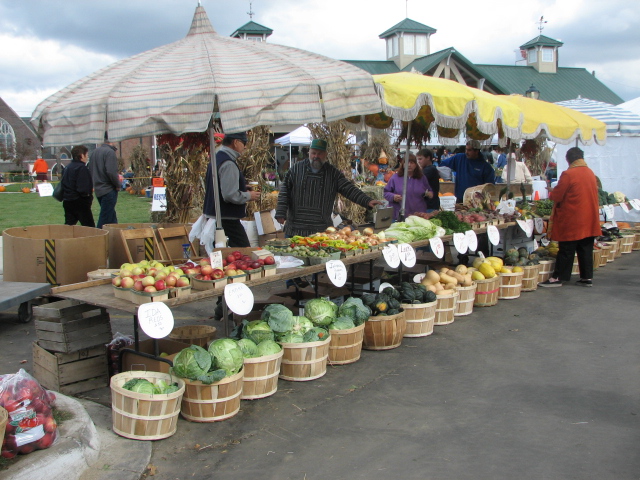
Image: Scott Stevenson/ARTZIEPHARTZIE graphic design. Retrieved from Wikimedia Commons.
By Katrianna Ray
Capital News Service
Michigan farmers markets can continue to operate under Gov. Gretchen Whitmer’s “Stay Home, Stay Safe” executive order, but because customers are staying home, many farmers are seeing a dip in demand for their products.
Some farmers markets have instituted social distancing measures make maintaining a safe distance easier for customers.
“Fulton Street Farmers Market is usually inside, but they moved us all outside, and then they spread everyone out so there is quite a lot of space between each of the vendors,” said Shelby Visser of Visser Farms in Zeeland. “They have the tape marks up so that you’re not walking within 6 feet of each other.”
If health-related requirements aren’t met, then the farmers markets can be closed by a market sponsor or operator and by county health departments.
“Holland Market is the other one we go to. They haven’t figured anything out yet, so they keep canceling it,” she said.
Farmers are finding other ways to sell their products without farmers markets.
Many family-owned farms are opening pop-up shops or selling their products over Facebook Marketplace, while Visser Farms added an online option to its website.
“We already use Square to process our credit cards,” she said, referring to the mobile payment company. “We just added our products on there.
“We were able to find a place in Holland that would let us set up a pop-up shop, and we’ve been there almost every day for the last few weeks,” she said.
The results have been promising, she said.
“It’s way better than I expected,” she said. “A lot of people are buying online ahead of time so they can pull up, say their name and get their stuff. There’s still a lot of people that come and shop like it is a normal market, too.”
Products with a long shelf life, like onions and potatoes, work best for online produce selling, according to Visser.
“In the summer, when we have celery, spinach and stuff, the inventory is always changing,” she said. “Some days, we pick everything we have and keep an online inventory. Keeping that up to date — I don’t think I would be able to handle that.”
Other organizations are stepping in to help support farmers who may be struggling to sell their products.
Taste the Local Difference of Traverse City is one of these organizations.
“Our whole mission is to support farm and food producers and educate the general public on how they can connect with local food businesses around the state of Michigan,” said Kelly Wilson, the director of community partners of Taste the Local Difference.
“During this time, we’ve really shifted our focus into supporting farms and farmers markets to adapt to the new climate,” Wilson said. “Markets are closing or opening later, and farms aren’t able to attend those markets or aren’t able to do direct consumer sales the way that they’re used to.”
Taste the Local Difference has been collecting information from locally owned farms and businesses around the state and placing them in a database so customers can locate online sellers near them. More than 200 businesses are listed.
Sales have “dramatically” increased for the partners, according to Wilson.
“One of our partners is a food hub/retail store called Agricole Farm Stop [in Chelsea] who has been doing over 300 transactions a day on their online food hub, which has been a huge uptick to what they were usually doing at their retail station,” she said.
Farmers can sign up to be a part of the database for free and can update their listings at any time.
Even though some farmers markets are able to continue modified operations, greenhouses and garden centers remain closed under the governor’s executive order.
Visser said, “We need to be able to sell greenhouse flowers at markets too because we have flowers in the spring.
“We can still sell our produce, but our greenhouses are overflowing with flowers right now, and we aren’t the only ones looking at seeing what we are going to do with all of them,” she said.
Retail garden centers have an estimated annual retail value of $580 to $700 million and over 9,000 employees in Michigan.
The Michigan Farm Bureau has asked Whitmer to declare the sale of flowering plants, vegetable plants and nursery stock as essential.